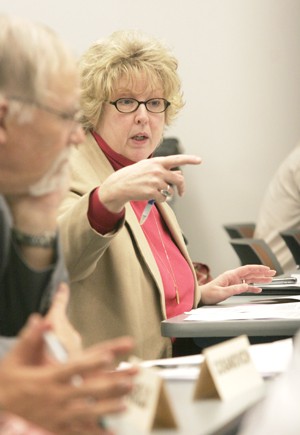Although the UA may not be significantly closer to definitive answers in the UA Transformation following the UA Faculty Senate meeting Monday, President Robert Shelton assured the university that the UA would not follow in ASU’s footsteps.
Though not on the agenda, the Senate noted that the president of Arizona State University, Michael Crow, had gone to the Arizona Board of Regents to file a state of financial emergency.
Shelton responded with an explanation of the implications of filing “”bankruptcy”” at a university, as well as his thoughts on the UA’s financial situation.
“”I think for an institution of the quality of the University of Arizona – again, I’m not speaking for anyone other than the UA,”” Shelton said. “”For an institution of this quality, it would be unthinkable to declare financial emergency, financial exigence or anything that is tantamount to that.””
Though the UA’s budget was already cut about $20 million at the beginning of the fiscal year and will undergo another budget cut, rumored to be 5 percent (about another $20 million dollars), Shelton said he “”can’t imagine”” taking an “”extraordinary step”” like filing fiscal emergency.
“”ABOR policy currently allows for the regents to declare a state of fiscal emergency or exigence, which then gives the presidents the initial authority to terminate contracts before the end of the contracted period,”” Shelton said.
Concerns were raised by Senator John Willerton, who said it “”seems like a pretty drastic measure”” and suggested Arizona Faculties Council looking into the matter.
Senator Jack Mutchler, who is also this year’s chair of the AFC, said they will be “”talking about it.””
Meanwhile, senators are still talking about the White Paper proposals and UA Transformation. As far as when the process will be over, Senator Wanda Howell said, “”I hope never.””
Those who implement the UA’s structure and programs should “”constantly be accountable,”” Howell said.
The next step in UA Transformation depends on the progress proposals have made, Howell said. Probably a dozen will continue on to approval, she said, while others will take more consultation.
“”Transformation is more than the White Papers,”” Senator Miranda Joseph said.
She said there are “”a lot of different components that need to be thought about together,”” including the college structure issues, tuition funds flow task force and the restructuring of curriculum.
Senator Peter Strittmatter, a member of the Retention and Advancement Task Force, gave a presentation to the Faculty Senate on the task force’s most recent report.
Their goals are to improve graduation rate (number and percentage), improve academic standards, increase total enrollment, recruit and retain exceptional students and recruit and retain diversity among students.
The way the task force attempts to fulfill their goals is by restructuring the UA degree program. Three degree types are recommended: a regular degree, multidisciplinary degree and honors degree, Strittmatter said.
Regular degrees would be available with honors as opposed to an honors degree, have off-campus options and an interdisciplinary program, as opposed to a multidisciplinary degree.
Multidisciplinary degrees, intended for non-specializing students, would have off-campus options, Strittmatter said.
To obtain a multidisciplinary degree, multiple subjects would be studied, each to a level less than a regular degree, he said.
Honors degrees, designed for the academic specialist, would be a modified version of the current Honors program.
Off-campus options were a major component of Strittmatter’s presentation, who said the task force “”suggests that the UA adopt a more flexible and supportive approach to its students, especially those that must work in order to finance their education.””
As to whether or not the restructuring of the degree program will occur and more off-campus options will become available, Strittmatter did not have definitive answers. He said that, personally, he thought implementation would be a “”major challenge,”” but was needed.









